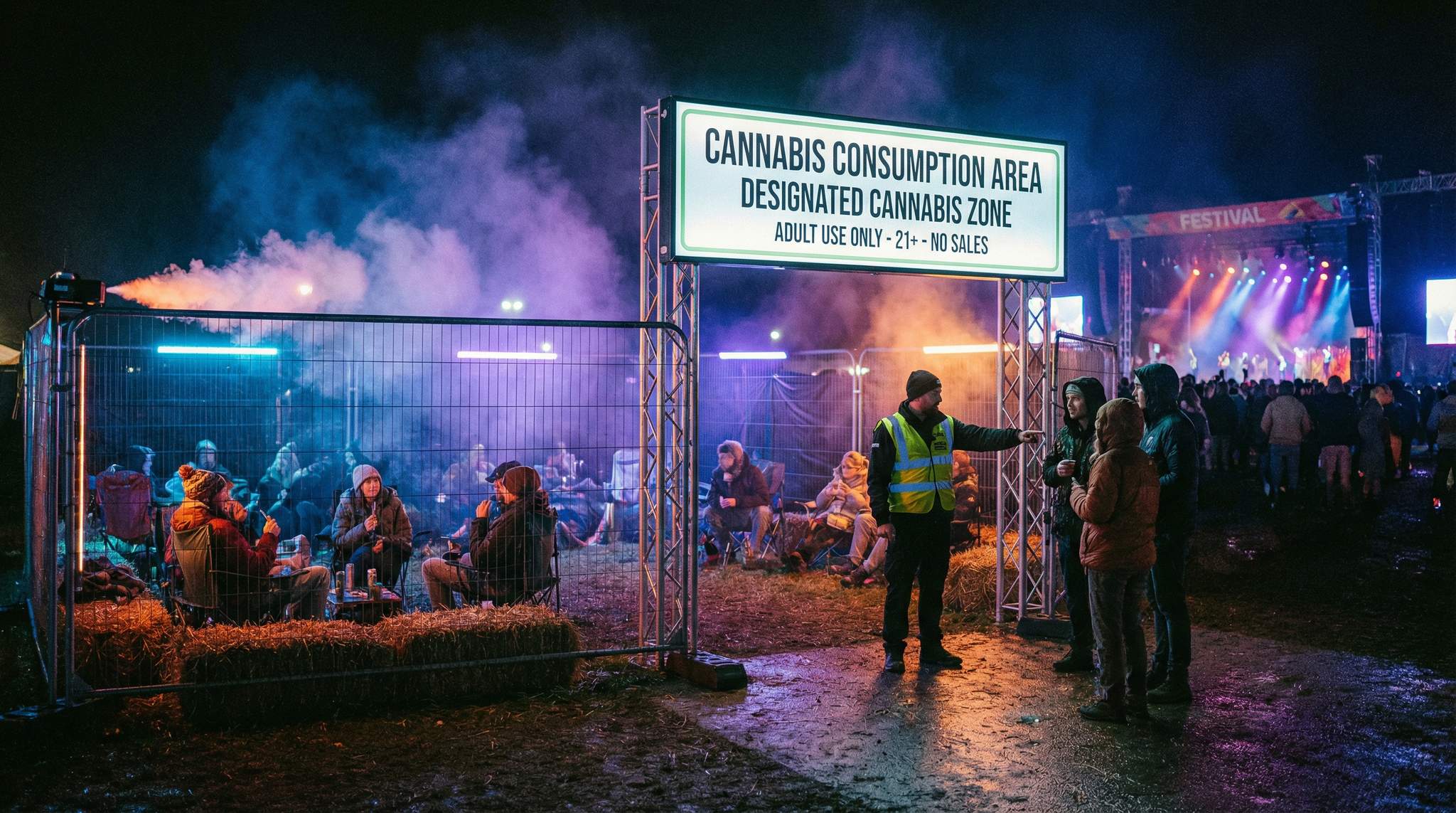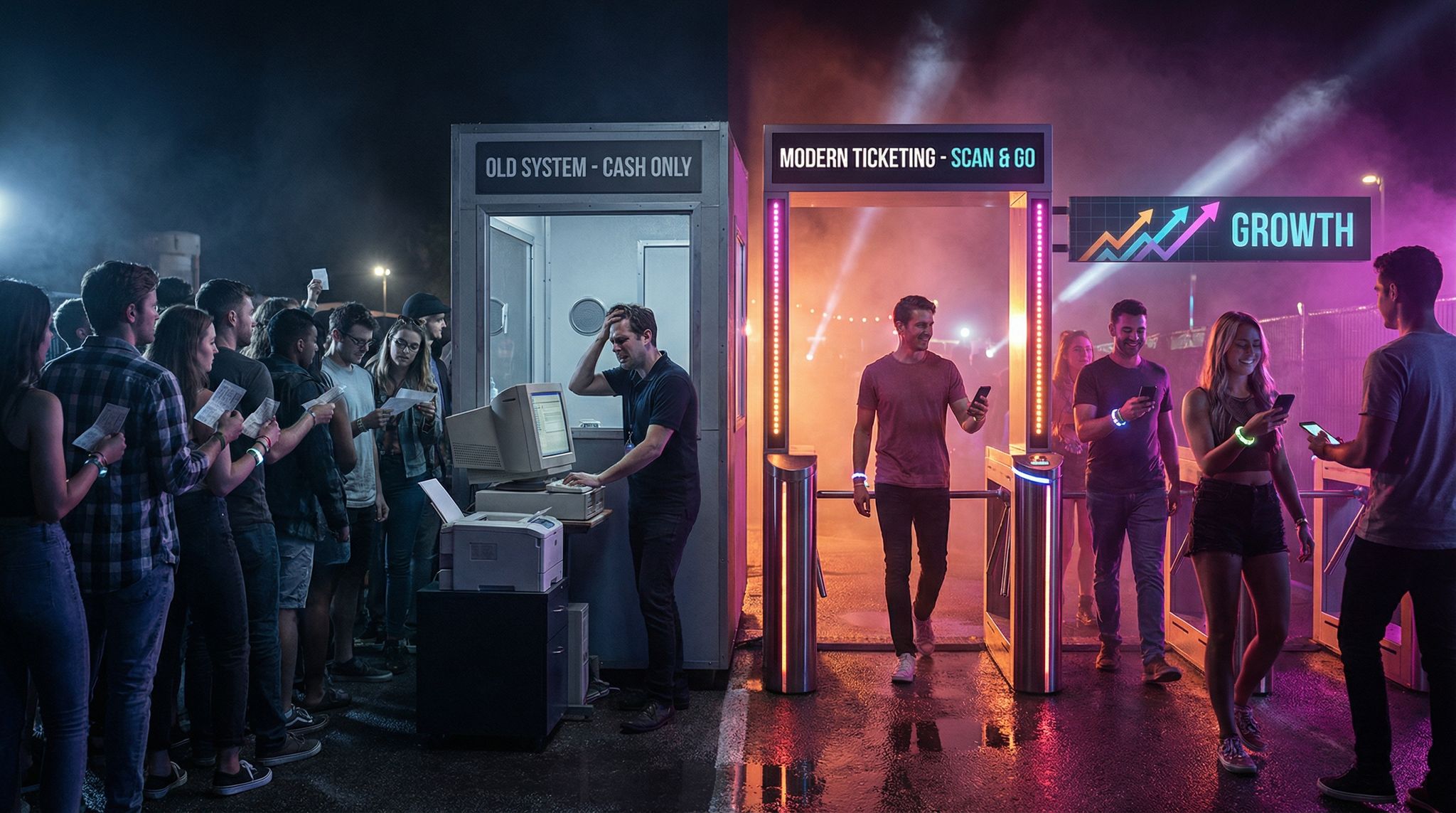Cannabis policies at festivals can be a controversial and complex aspect of event planning. Different regions have widely varying laws and cultural attitudes towards cannabis use, which means festival producers must navigate this landscape carefully. A clear, law-abiding cannabis policy can prevent confusion and conflict, ensuring everyone stays safe and the event runs smoothly. This article offers seasoned advice on managing cannabis at festivals – from strict no-use scenarios to harm reduction at events where cannabis is legal. The goal is simple: compliance, not chaos, so that your festival’s vibe remains positive and trouble-free.
Know and Follow Local Laws to the Letter
The foundation of any cannabis policy is full compliance with local laws. Every country, state, or city will have its own regulations – some ban cannabis entirely, others allow medical use only, and a growing number permit recreational use under strict conditions. As a festival producer, you have a duty to research and obey these laws without exception. If cannabis consumption is prohibited in your venue’s jurisdiction, make it crystal clear that it’s not allowed on-site. Never assume a festival setting gives attendees a free pass to break the law.
For example, in places like Singapore or Indonesia, where cannabis laws are extremely strict, even a small infraction could lead to severe legal consequences. In such regions, adopt a zero-tolerance policy and coordinate with local authorities to show you’re taking enforcement seriously. Conversely, in locales like parts of the USA (e.g. Colorado or California) or Canada where cannabis is legal, you may be able to accommodate it – but only under the precise rules set by law. This might mean designated smoking areas, age-restricted entry (21+ in many jurisdictions), or special permits for on-site consumption. Always double-check that your event permits cover any cannabis-related activities and that all officials involved in approvals know about your festival’s plans.
Staying within the law isn’t just about avoiding fines or shutdowns – it’s about building trust with authorities and the community. One of Europe’s largest reggae festivals, Rototom Sunsplash, actually relocated from Italy to Spain in 2010 largely due to legal pressures around drug policy. In Italy, cannabis was classified on par with hard drugs, creating a hostile environment for the event. Spain’s more tolerant stance on personal cannabis use provided a safer haven. The lesson is clear: choose venues and policies that align with local law, and if that law is permissive, still operate strictly within its boundaries. By doing so, you protect your festival’s longevity and reputation.
Accept Payments Across 8 Global Markets
Local currency processing in the US, UK, Canada, Australia, New Zealand, India, Indonesia, and Mexico with region-specific payment methods.
Post Clear, Multilingual Signage of Rules
No matter what your cannabis policy is, make sure it is highly visible and clearly communicated to attendees. The simplest way is through prominent signage and announcements. If cannabis use is forbidden, signs at entry gates, camping areas, and stage viewing areas should state “No Drug Use – Including Cannabis – Allowed on Premises” (or similar wording). Use universal no-smoking symbols along with text for easy understanding. If your festival operates in a multilingual region or attracts international visitors, provide multilingual signage so nothing gets lost in translation. An attendee from overseas might genuinely be unaware of local cannabis rules; a sign in their language can prevent an innocent mistake from turning into an incident.
When cannabis is allowed in some capacity, signage is equally critical. Mark the boundaries of any designated smoking or vaping areas with large, clear signs (e.g. “Cannabis Consumption Area – 21+ Only – No Smoking Beyond This Point”). Inside those zones, post reminders about on-site rules like no sales (unless licensed), no minors, and any limits on quantity. Also include health and safety reminders in a friendly tone, such as cautioning about overconsumption or mixing substances. Clear signs demonstrate that the festival has a structured plan rather than a free-for-all. They set expectations for attendees and give security staff a reference point – it’s easier to enforce a rule that’s printed on a big sign in plain sight.
Planning a Festival?
Ticket Fairy's festival ticketing platform handles multi-day passes, RFID wristbands, and complex festival operations.
Beyond physical signs, communicate the cannabis policy through all channels: your website FAQ, email newsletters, social media, and on tickets. Repetition in multiple languages and formats ensures everyone gets the message. For instance, a festival in California might publish guidelines in English and Spanish, while one in Europe could include English plus the local language (French, German, etc.) depending on the audience. By broadcasting the rules clearly before and during the event, you minimize surprises and encourage attendees to self-regulate their behavior.
Train Security to De-escalate, Not Moralize
Even with strict policies and good signage, you should assume that at some point someone will attempt to light up in the wrong place or in violation of the rules. How your team handles these situations can make the difference between a minor hiccup and a major conflict. All security and volunteer staff need training in de-escalation techniques specific to substance use. The objective is to redirect and educate, not punish or shame. In practice, this means instructing security personnel to stay calm, be respectful, and focus on solutions.
For example, if a staff member sees an attendee smoking cannabis where it’s not allowed, they should politely inform them of the policy and ask them to stop or move to the designated area (if one exists). Phrases like “Hey, we get it – you’re here to have fun, but for everyone’s safety we can’t have smoking in this area. Could you head over to the marked zone if you want to continue?” are firm yet non-confrontational. The tone matters. Avoid moralising or lecturing the attendee about drug use; that’s not the job of event staff, and it will only create defensiveness. Instead, the focus is on the behavior in the context of the event’s rules.
Security teams should also know when to involve medical or supervisory staff. If someone appears overly intoxicated or is reacting badly (e.g. extreme anxiety or nausea from overconsumption), approach with empathy. It might be appropriate to escort them to a first aid or chill-out area (not just throw them out, unless they pose a safety risk). Emphasize to your team that attendees shouldn’t be treated like criminals for minor infractions – often a gentle reminder is all it takes. By prioritizing de-escalation, you maintain a positive atmosphere and can resolve issues without drama, which in turn prevents drawing unwanted attention from law enforcement or disturbing other guests.
Data-Driven Event Marketing
Track ticket sales, demographics, marketing ROI, and social reach in real time. Exportable reports give you the insights to make smarter decisions.
Provide Sober Spaces and Visible Hydration
A truly festival-friendly cannabis policy cares for everyone – those who partake and those who don’t. One best practice is to set up sober spaces or “chill-out zones” that are substance-free and easily accessible. These areas can serve multiple purposes. They give non-using attendees a comfortable refuge away from any smoke or intoxicated behavior. They also act as a safe retreat for anyone who might feel overwhelmed or unwell after consuming cannabis (or other substances). Stock these spaces with plenty of water, light snacks, comfy seating (think shade, benches or even bean bags), and basic first aid support. For example, some events provide blankets, phone charging stations, or even quiet activities like colouring books to help people calm down.
Hydration cannot be emphasized enough – cannabis use (especially when combined with dancing, hot weather, or alcohol) can lead to dehydration or that infamous “cottonmouth.” Make sure water stations are highly visible and plentiful throughout your venue. Offer free water refills if possible, or at least keep bottled water prices very low. Attendees should never have to search far for a drink of water. At major festivals like Rototom Sunsplash, organizers have taken pride in providing free drinking water as a matter of principle, declaring that “water is a right, not a business”. Easy access to hydration helps everyone pace themselves, stay healthy, and recover faster if they’ve overindulged.
Need Festival Funding?
Get the capital you need to book headliners, secure venues, and scale your festival production.
By carving out sober-friendly zones and prioritising health basics like hydration, you create an environment where all guests feel cared for. This goes a long way toward making your festival inclusive. It shows you value the experience of attendees who choose not to use cannabis or alcohol, as well as the safety of those who do. In turn, this proactive hospitality can reduce medical incidents and conflicts, because people have the resources to take care of themselves and each other.
If Legal, Embrace Harm-Reduction Education (Not Sales)
When cannabis is legal at your festival’s location, you have an opportunity to approach it in a progressive, educational way. Rather than ignoring cannabis use (or simply profiting from it), consider partnering with licensed educators or harm-reduction organizations to provide information and support. The key is to educate, not advertise. For instance, you might invite a local cannabis education group or healthcare professionals to staff a small informational booth. They can offer pamphlets on responsible consumption, one-on-one advice on things like dosing and effects, and maybe even freebies like wallet-cards with safety tips. Some festivals have worked with harm-reduction nonprofits who already operate at music events, expanding their scope to include cannabis safety alongside other substances.
It’s important that any educational presence be neutral and factual. This is not the place for a cannabis brand to push sales or hand out potent product samples. In fact, many jurisdictions forbid on-site sales or distribution of cannabis at events unless by licensed vendors in controlled areas. So instead of a sales pitch, focus on messaging like “Know Your Dose” (encouraging low-dose trials for novices), “Don’t Drive High” (promoting alternate transport for afterwards), and informing about the law (like age restrictions and where it’s legal to consume). By providing this resource, you show regulators and attendees alike that your festival takes responsible use seriously.
Another benefit: parents or community members who might be skeptical about your festival’s cannabis policy could be reassured seeing a visible commitment to safety. And users themselves often appreciate having honest information on hand. As a bonus, if there’s medical assistance on-site, make sure they’re equipped to handle overconsumption cases – sometimes just a friendly medic who can talk a panicky guest through a “too high” episode is worth its weight in gold. In short, treat cannabis like the substance it is – one that people should approach with respect and knowledge. If the law permits, educate and facilitate harm reduction as part of your compliance strategy.
Tailor Policies to Your Festival’s Size and Audience
Cannabis policies are not one-size-fits-all. A boutique yoga and wellness festival will handle this issue differently than a 50,000-person weekend music festival. Always tailor your approach to fit the event’s character, scale, and attendees:
- Festival Genre & Culture: Consider the expectations of your crowd. A reggae or counterculture music festival might have a higher proportion of attendees expecting tolerance towards cannabis, whereas a family-oriented food festival or an e-sports event might require a firmer stance and minimal exposure. Align your messaging accordingly – it’s possible to stay compliant with the law while also respecting the culture of your event. Just be careful to never promote illegal behavior even if a subculture might be more lenient; your role as producer is to find a balance that keeps everyone safe and the authorities satisfied.
- Audience Age and Demographics: Know your audience. If your festival is 18+ or 21+ by design (for example, many electronic music festivals or cannabis expos are adult-only), you can enforce age-gated entry so that only legal adults are present. Use your ticketing platform to help with this – for instance, Ticket Fairy’s ticketing system allows organizers to set age restrictions and communicate ID requirements clearly at purchase and check-in. If your event is all-ages or has many families, even in a legal-cannabis region you might choose to ban on-site consumption entirely to maintain a family-friendly atmosphere.
- Festival Size & Resources: The larger the event, the more formal your cannabis policy implementation should be. Big festivals need robust systems: professional security companies briefed on local drug laws, on-site medical teams prepared for any drug or alcohol-related incidents, and perhaps liaison officers to coordinate with police discreetly. Small local festivals, on the other hand, might rely on volunteer staff and have a closer relationship with the local community. In those cases, personal communication (like a staff member gently reminding a known local attendee of the rules) might work alongside basic signage. Regardless of size, plan for the worst-case scenario – even a tiny event should have a protocol if someone is caught with illegal substances or if an attendee has an adverse reaction.
Remember that transparency is your friend. Be upfront with your attendees about what to expect. If you’re running a wellness retreat, let people know it’s a sober experience aside from maybe a controlled ceremonial context. If you’re hosting a music festival in a place where cannabis is legal, inform attendees how they can partake legally (if at all). By tailoring your policy to your festival’s context and clearly conveying it, you demonstrate professionalism and care – qualities that both festival-goers and authorities will appreciate.
Clarity Prevents Conflict
At the end of the day, a solid cannabis policy for festivals boils down to clarity, consistency, and compassion. Make the rules clear as day, follow them consistently, and enforce them with a humane touch. The goal is to keep the vibe enjoyable for everyone while safeguarding your event’s legality and reputation. Whether your festival is a small community gathering or a massive international event, the principles remain the same: know the law, educate your team and audience, and provide the tools for attendees to have fun safely.
Cannabis needn’t be a chaos-causing factor at your festival. With thorough planning and a commitment to compliance and care, you can accommodate or prohibit it in a way that feels natural, not heavy-handed. The next generation of festival producers can take these lessons – learned from both success stories and hard-earned experiences – and create events where there’s no confusion about cannabis. Clear policies prevent conflict, letting the focus stay where it should: on the music, art, food, or culture that brought everyone together in the first place.
Frequently Asked Questions
How should festival organizers develop a cannabis policy?
Festival producers must research and strictly follow local laws, ranging from zero-tolerance bans to designated consumption areas. Compliance is the foundation of any policy, requiring coordination with local authorities to avoid legal consequences. Organizers should never assume a festival setting grants immunity and must tailor rules to align with specific regional regulations.
What are effective ways to communicate cannabis rules at events?
Organizers should post prominent, multilingual signage at entry gates and specific zones using universal symbols to ensure understanding. If consumption is allowed, clearly mark designated areas with age restrictions and boundaries. Additionally, publishing guidelines on websites, social media, and tickets helps minimize surprises and encourages attendees to self-regulate their behavior before arriving.
How should security staff handle cannabis use at festivals?
Security personnel should use de-escalation techniques to redirect and educate attendees rather than punish them. Staff must politely inform guests of the rules and direct them to designated areas if available. The focus remains on safety and solutions, avoiding moralizing lectures, while involving medical staff only for severe intoxication or health risks.
Why should festivals provide sober spaces and chill-out zones?
Sober spaces provide a safe, substance-free refuge for non-using attendees and those feeling overwhelmed or unwell. These areas should offer comfortable seating, shade, and easy access to hydration to prevent dehydration. Creating these inclusive environments demonstrates proactive hospitality, reducing medical incidents and ensuring all guests feel cared for regardless of substance use.
How can festivals implement cannabis harm reduction strategies?
In regions where cannabis is legal, festivals can partner with licensed educators to provide neutral, factual safety information instead of pushing sales. Harm reduction efforts include distributing pamphlets on responsible dosing and offering medical support for overconsumption. This educational approach builds trust with authorities and reassures the community of the event’s commitment to safety.
How do ticketing platforms help with festival cannabis compliance?
Events can utilize ticketing systems like Ticket Fairy to set strict age restrictions and communicate ID requirements during the purchase process. For adult-only festivals or designated consumption areas, enforcing 21+ entry ensures compliance with local laws. Tailoring these controls to the specific audience demographics helps maintain a safe, legal environment.





